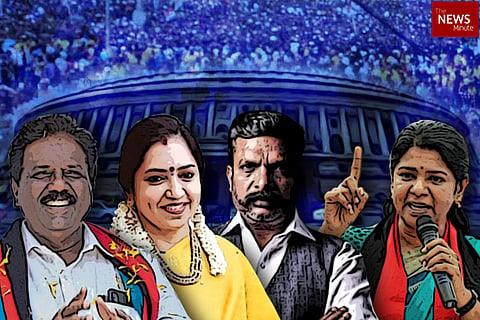

Ever since the results to the Lok Sabha polls came out, BJP’s State president Tamilisai Soundarrajan has been talking about how Tamil Nadu will soon regret its mandate. It, of course, comes with a rider: “The Centre will heed to the demands of the opposition, but from us, the demands would be easier met.”
Voices about how Tamil Nadu will be made to ‘pay for its rebellion’ are not uncommon in social media and otherwise. And then there are arguments that cry hoarse about how the 37 seats have been ‘wasted’ and ‘not put to good use’ doing the rounds.
For one, no voice will remain unheard as long as it is raised. Among the 37 members elected to represent Tamil Nadu, there are some fine minds. Thol Thirumavalavan, for example, combines with finesse his intellectual prowess with political leadership.
There are writers among the 37.
Thamizhachi Thangapandian has twenty books to her credit and thinks it is possible to continue her writing, given her efficiency in time management.
A fine writer in Tamil Marxist tradition, Su Venkatesan has won a Sahitya Akademi for his debut novel Kaaval Kottam – an exhaustive document on the history of Madurai. His second novel Veerayuga Nayagan Velpari, serialised in Ananda Vikatan, gives a contemporary context to the life of Pari – a tribal chieftain from Sangam era. Almost single-handedly, Venkatesan brought the Keezhadi excavation to the limelight, putting it on the political map.
Besides publishing a short story collection and a novel in Tamil, Jothimani has documented her experiences as a councillor to bring water to a locality populated by Dalits in her book Neer Pirakkum Mun, later translated into English as No Shortcut to Leadership. The book also speaks about Jothimani’s humble background and her struggle to become who she is today.
Between polling and counting, D Ravikumar – now MP from Villupuram constituency – lost no time in his intellectual pursuit. Just two days before the results were announced, Ravikumar released two books – one on mythological Dalit icon Nandhan and another on Rajinikanth’s politics. Besides, Ravikumar is a poet, short story writer and an able translator.
Known for her sensitive language, Kanimozhi has five books to her credit including essays and poems.
As writers, they are known to speak their minds. Jothimani for example, took a stand against her party Congress’s decision to support the 10% reservation for the upper caste poor.
Also in Tamil Nadu, federalism remains a central idea to the Dravidian ideology that has ruled the state for well over five decades. Tamil Nadu’s verdict in 2014 and in 2019 should be seen in the context of its fervent endorsement of the idea of federalism. The regional parties started gaining an upper hand in Lok Sabha elections since 1967 in Tamil Nadu, but it was not until 1989 that they were part of the cabinet -- barring Sathyavani Muthu, then with the AIADMK, who held a position in the short-lived cabinet of Charan Singh in 1979. Both the AIADMK, led by Jayalalithaa, and the DMK, have sought to protect their own spaces even when they were a part of the Union government. There have been occasions when the regional parties have expressed dissent when the Union government went against the interests of the state.
The BJP today will certainly not need its foes to form the government, but with a clear mandate, it does not need its allies too. Tamilisai’s argument that the AIADMK and its allies, if elected, could have had their demands met better hardly holds any water given the recent history. Jayalalithaa had stiffly opposed many central schemes, including UDAY, NEET, and GST. The schemes that the people have been fighting against found its way into the state when she was hospitalised, much of it after compromises made by the state.
To write off dissenting voices as ‘maladjusted minority’ that serves no purpose only because they dissent puts democracy in jeopardy.
Dissenting voices shine a brighter light on the virtues of democracy. From Tamil Nadu, the voices are known to fight hard to ensure that the idea of India remains just that.
Kavitha Muralidharan is a journalist with two decades of experience, writing on politics, culture, literature and cinema. Views expressed are the author's own.